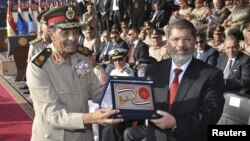Former U.S. Ambassador to Egypt Daniel Kurtzer says Egyptian President Mohamed Morsi's surprise appointment of a young general as defense minister appears to be a sign of a long-running split in the country's top military council.
Fifty-eight-year-old General Abdel-Fattah el-Sissi was sworn in as defense minister and military commander-in-chief on Sunday, replacing 76-year-old Field Marshal Hussein Tantawi, whom Morsi ordered to retire.
Morsi said the move was part of an agreement with the Supreme Council of the Armed Forces (SCAF), which led Egypt for 16 months until the president took office in June. But, some observers said younger SCAF members sided with Morsi to push out aging generals accused of mishandling Egypt's political transition.
An apparent rift
In an interview with VOA, Kurtzer said it was clear to him that there was "no unanimity" within SCAF's ranks from the time it took control of Egypt during a February 2011 popular uprising that ousted longtime autocratic president Hosni Mubarak.
"We saw manifestations of that split in some of the decisions that were reversed by SCAF pretty quickly after they were instituted," said Kurtzer, who served as U.S. ambassador in Cairo from 1998 to 2001.
"They were reversed under what looked like some pressure from the outside, but I think it also clearly showed that there was at least a faction from within that seized upon opposition from the outside to reverse decisions."
Kurtzer, a Middle East policy studies professor at Princeton University, said those decisions include SCAF's November 2011 draft declaration of constitutional principles, under which the generals called for excluding civilians from oversight of military affairs and budgets.
"There was a lot of protest from the outside and that document was withdrawn at the time," he said. "It came back into play in June 2012 and that's one of the documents that President Morsi has now abrogated."
Lack of transparency
Speaking by phone from Israel, Kurtzer said SCAF is an opaque institution whose key decision makers are hard to uncover. "But I would not be surprised if [General Sissi] was among those who didn't agree necessarily with everything that the very senior [SCAF] leadership was doing."
General Sissi comes from a religious family and secular critics have accused him of having secret ties to Morsi's Muslim Brotherhood movement – an allegation SCAF has denied.
Kurtzer said the general's background does not appear to have worried the United States, which provides Egypt with $1.3 billion in annual military aid.
"I understand from contacts in Washington that [Sissi] has a good reputation among our military," Kurtzer said. "They've gotten to know him in a variety of roles, including one in which he spent about a year in the United States in training."
Sissi had served as Egypt's military intelligence chief since the February 2011 uprising. In that role, he was one of the few SCAF members to meet with critics of military rule, defending military policies, but also acknowledging the need for change.




